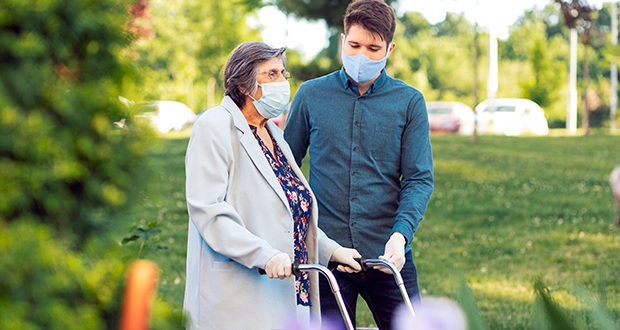‘Freedom day’ in NSW has arrived, and families, staff and residents are preparing for increased visits with loved ones after enduring over three months of strict isolation.
As part of the eased restrictions, aged care residents are permitted two visits each week from a fully vaccinated friend or family member.
Healing the emotional toll of successive lockdowns will require patience and understanding, according to mental health experts.
“I think people have been very traumatised because of their feelings of helplessness, and the unpredictability of the situation,” said clinical psychologist Dr Sunil Bhar.
“We’re seeing issues such as anger, grief, anxiety, stress and worry, not only for their own health and safety but worry for their families.”
The impact of COVID-19 on mental health has been widespread, and the second year of lockdowns has had a devastating impact on the aged care sector.
Bhar and his colleagues from Swinburne University of Technology surveyed hundreds of aged care facilities to assess its toll on the emotional wellbeing residents and staff.
They found that almost half of residents had experienced elevated anxiety and depression over the past two years.
“People have missed out on significant milestone events, and aged care residents at the moment are feeling very isolated and very lonely,” said Bhar.
“The same patterns were found in staff as well: about a third reported more anxiety, and about 20 per cent reported more depression.
“Workers were very worried about introducing COVID into their own facility.”
Although restrictions in NSW have eased, the presence of the virus is causing many to feel anxious or uneasy.
Bhar anticipates that anxiety related mental health symptoms will persist into the future.
“I think that even once the numbers die off, or the numbers of COVID cases fall away, the ramifications on mental health are going to be felt for some time,” he said.
“We’re going to see a lot of lingering effects, and there’s been a lot of conflict within families around being able to visit family members and around vaccinations."
After a tough year, rebuilding relationships with isolated loved ones will take time, but there are ways to jumpstart recovery.
Bhar said that families who feel afraid to visit their loved ones due to the risk of spreading the virus should not be too critical of themselves.
“I think they just need to appreciate that it's quite normal to feel conflicted about that,” he said.
“It doesn't mean that you're a bad person, if you feel somewhat nervous about rushing into a facility, your anxiety and ambivalence is quite normal.”
With a mountain of new infection processes underway, workers and families will need to learn to communicate effectively to adjust to the changes, said Bhar.
He suggests that families take the directives of staff, and in return, workers should implement a trauma-informed approach when organising visits.
“There are a lot of logistical, but also emotional issues that families might need to contend with when entering into facilities and there's a lot of inconsistency,” he said.
“As a family member, you also need to realise that you're entering into a highly charged environment, where staff are extremely stressed, and they've got a bazillion protocols to go through.”
One of the most frequently reported sources of stress for staff was that they didn’t know how to support their residents, according to Bhar's survey.
Organisations should seek creative ways to reduce staff workloads and implement more training around mental health, he said.
“Staff need access to proper counselling, proper emotional support, and proper forums where they can share what's going on for them, without being afraid of insulting their employer.”
Self care is also paramount to navigating the next stages of the pandemic, he said.
“Keep your exercise regime going, keep your diet, try to get a good night's rest. But most importantly, also reaching out for support and counselling, if you need it.”
Bhar, who is the director of Swinburne University of Technology's wellbeing clinic for older adults, has set up a telehealth counselling service for staff, residents and their families.
The service is free and accessible from anywhere in Australia.
Peaks call for clarity
The federal government has backed the Australian Health Protection Principal Committee’s (AHPPC) new guidelines for allowing visitors safety back into the nation's aged care facilities.
Chief executive of Aged & Community Services Australia (ACSA), Paul Sadler, welcomed the roadmap, but said that the document needed more detail.
“There’s a lot of practical issues which are not clear,” said Sadler.
“A big issue for us is going to be the whole question of how you manage the continued risks of an outbreak in an aged care service where you’ve got relatively high levels of community transmission.”
The AHPPC noted that there may be potential for a return to visitor restrictions in local areas, but did not specify the level of community transmission to warrant a shutdown.
Sadler argues that providers should not have to make the call about whether they need additional restrictions in their facilities.
“We need these sorts of rules and be clear,” he added.
Rapid antigen testing pilots have been underway in facilities inside Sydney’s LGAs of concern, with generally positive feedback from providers, according to Sadler.
Practical issues, including how often the tests should be applied, and whether they are required daily, have yet to be addressed by the government.
The AHPPC guidelines did not mention rapid antigen testing or additional precautionary measures.
“There’s some calibration which we need to resolve with the state and federal governments around what role rapid antigen testing may play,” said Sadler.
“It’s also interesting that the AHPPC talked about encouraging vaccination for visitors, but they didn’t say it would be mandatory.
“We need the guidance now, this is a real issue.”
Do you have an idea for a story?Email [email protected]
 Aged Care Insite Australia's number one aged care news source
Aged Care Insite Australia's number one aged care news source

